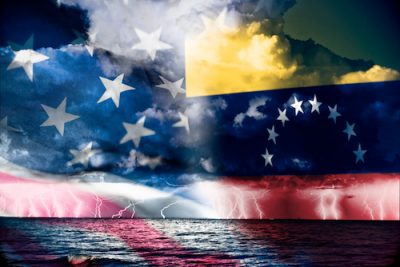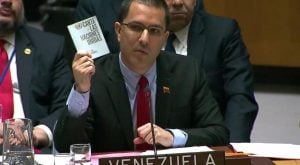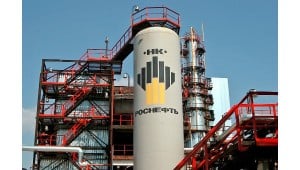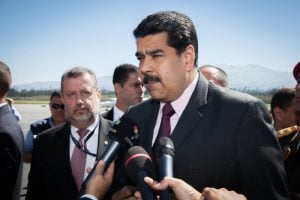Venezuela Responds with Principled Conviction to the US’ Desperate Attempts at Regime Change

The continued effort to overthrow President Maduro does not seem to produce the intended results for the perpetrators, but rather sends signals of desperation. The regime change plotters may be wishing to achieve what they did in Bolivia. But that is not likely to happen anytime soon. That must cause some political frustration in Washington and of course more resistance in Caracas.
We can summarise the main tenets of US foreign policy for regime change as to reject any progressive sovereign and independent government that challenges the capitalist and imperialist ideology of the US, by simply labelling it as a threat to its national security, in order to secure, gain control and exploit the rich natural resources of that country on behalf of US corporations no matter where they are.
The US has failed in Venezuela at least since the unsuccessful coup against Hugo Chavez in 2002. And even more dramatically since January last year when Washington zeroed in on the previously unknown Juan Guaidó as their candidate for the virtual government of their choice.
Washington miserable failure is not due to lack of trying.
Venezuelan Minister of Foreign Affairs Jorge Arreaza (image on the right) on February 25 reported at the 43rd session of the UN Human Rights Council in Geneva – of which Venezuela is a member for the third time – that “since 2014, more than 300 unilateral measures have been taken by the United States to affect the functioning of the economy and undermine the human rights of the Venezuelan people.” He also referred to other research that establishes the death toll by US sanctions at 40,000 Venezuelans.
The unilateral coercive measures not only impact Venezuelan assets and people, but they also exert a full economic and financial blockade that prevents Venezuela to access financial and trade markets for essential imports like medicine and food. Perhaps more critically they have an extra territorial component by threatening or forcing other countries to comply with US coercive measures. This is when the term “coercive measures” becomes more descriptive to Venezuelans as opposed to “sanctions” that by definition are “provisions of a law enacting a penalty for disobedience or a reward for obedience” where “law” is a foreign law.
The consistent US drive in its aggression since the beginning of 2019 is to entirely crush Venezuela’s oil sector, the main source of revenues for the country. Just last February 18 the US Department of the Treasury’s Office of Foreign Assets Control (OFAC) targeted Russia by blocking “all property and interests in property of [Russian subsidiary] Rosneft Trading S.A. and [its chairman] Didier Casimiro that are in the United States or in the possession or control of U.S. persons”. Rosneft is associated with the Venezuelan oil company PDVSA and is the largest receiver of Venezuelan oil.
According to Reuters, US Special Representative for Venezuela Elliott Abrams declared that Washington will “push harder on the Venezuelan oil sector.” The US Treasury Department first levied financial sanctions against PDVSA in August 2017. Abrams went further suggesting the international policing role of the US watching possible ship-to-ship or company-to-company transfers of Venezuelan oil, “We are going to follow up with the companies that are engaged in this and we are going to sanction them.” He made it clear that the second largest receiver of Venezuelan oil, the China National Petroleum Corp, will not be ignored.
Caracas, Moscow as well as Beijing consistently continue to reject US unilateral coercive measures. The Chinese Ministry of Foreign Affairs has also being reported to express his opposition to the US “sanctions” against Russian state oil company Rosneft for trading with Venezuela: “We oppose any interference in the internal affairs of other countries, just as we are against unilateral sanctions and extraterritorial jurisdiction.”
However, despite last October visit to India by Venezuela’s Vice President Delcy Rodriguez to enhance bilateral cooperation, India has made a different choice. Two Indian oil companies have announced that they will comply with US threats of “sanctions” declared by President Trump in a press conference during his visit to India in late February. Prime Minister Narendra Modi’s government’s pro-Trump pivot may well be a political move that may reveal Modi’s pathetic attempt to please Trump. Modi’s ultimate intentions may well be to distract the international opinion from his abysmal Hindu supremacist policy by preventing the #US from using that against him if he did not comply to US demands.
More significantly, countering India’s about face, is the failure of the “Lima Group” meeting in Ottawa last February 20. The meeting of an undeclared number of foreign ministers was met by protests of Canadians, and this author addressed an open letter to Canadian Prime Minister Justin Trudeau with relevant political questions about Canada’s intervention in Venezuelan affairs.
The “Lima Group” only managed to produce a bland statement where the strongest threat was “In the coming days and weeks, representatives of the Lima Group will participate in an intensive period of international efforts and consultation with all countries interested in the restoration of democracy in Venezuela.” That they have being doing now for two and half years and is expected to continue with no predictable successful outcome. By far what stood out in the statement is the absence of any reference to the unelected “interim president” Juan Guaidó.
The urgency to overthrow Maduro is not founded on re-establishing “democracy” and the “rule of law” in Venezuela but rather on the “danger” of “normalising the situation”, as Peruvian Minister of Foreign Affairs Gustavo Meza Cuadra, who participated in the “Lima Group” meeting, stated in a press conference in Lima. This is urgency masking desperation.
The sheer power of the US coercive measures is obviously having a quantifiable stunning impact on the growth of the economy and on the well-being of the general population, but that is not sufficient to deter resolved Venezuelans to preserve their sovereignty and what they have achieved in more than twenty years of establishing a fully autonomous State. To what appears to be a step up of US threats against Venezuela the Venezuelan government has also stepped up its resistance.
In contrast to the desperate actions for regime change by the US and its accomplices, Venezuela acts with the strength of principled conviction and optimism.
To the threats of a US military invasion and a naval blockade, and in the face of crippling “sanctions” as an act of war, Venezuela responds with military exercises in a display of unique civic-military coordination.
Maduro declared recently, “We have to consider that we have constantly lived in a war economy.” In fact, we can add that this is a Hybrid War that relies on disinformation, on smear campaigns, and on a virtual army of financiers and the might of the US dollar. As a response to this challenge Maduro is aiming to increase oil production and to this end he has appointed a “commission to overhaul the country’s oil industry”. More broadly, Venezuela is also reviving an additional “army” called “Productive Army Workers” as an “unconventional army for an unconventional war”. This group of about 2,300 workers have the objective of helping reactivate the national productive apparatus by refurbishing factories, machinery and equipment in a recovery process across the country so that they may start producing again.
Perhaps the most visible action at the international level has been the filing of a lawsuit at the International Criminal Court in The Hague, Holland, by the Venezuelan government to investigate the actions of the US government over the use of “sanctions”. A 60-page supporting document describes unilateral coercive measures as a “crime against humanity” and equates them to “weapons of mass destruction.” They are considered by many to be illegal under UN, OAS and US Law. Although the US is no longer a member of the ICC, the lawsuit will make a clear statement internationally.
With the kind of background described above that includes a domestic environment akin to a country under siege only seen in war situations, Venezuela prepares for yet another election. Legislative elections are scheduled to take place in December of this year with the participation of various opposition parties. Only Guaidó has taken the position of the US government and the “Lima Group” of not participating unless a transition government is formed leading to presidential elections…like in Bolivia. But we need to ask, do foreign governments decide about elections in Venezuela?
*
Note to readers: please click the share buttons above or below. Forward this article to your email lists. Crosspost on your blog site, internet forums. etc.
Nino Pagliccia is an activist and freelance writer based in Vancouver. He is a retired researcher from the University of British Columbia, Canada. He is a Venezuelan-Canadian who follows and writes about international relations with a focus on the Americas. He is the editor of the book “Cuba Solidarity in Canada – Five Decades of People-to-People Foreign Relations” (2014). He is a frequent contributor to Global Research.




